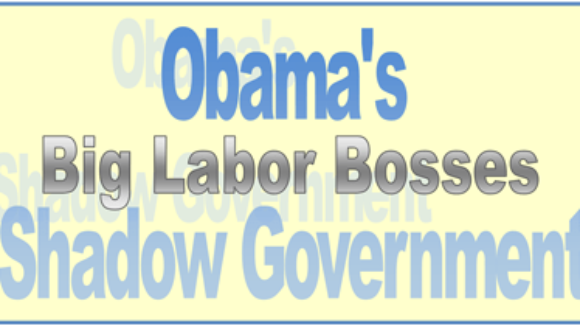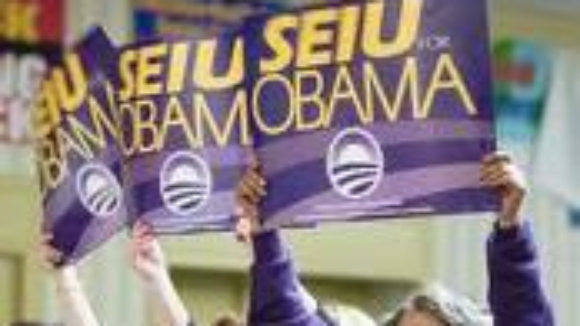Union Bosses Pushed to End Filibuster
No one should be surprised to hear that the real push behind the effort to end the filibuster in the US Senate was the union bosses. From Katrina Trinko at the…

No one should be surprised to hear that the real push behind the effort to end the filibuster in the US Senate was the union bosses. From Katrina Trinko at the…
Forced-dues funding radical left extremists. …
Forced-dues funding radical left extremists. …

Trying to increase the number of workers who are forced to pay union dues as a condition of employment is perhaps the TOP priority for President Obama at the moment. Michael Barone takes the president to task for his consistent refusal to say no to the union bosses. Here is his rundown: [Obama] certainly can demonstrate that he cares about certain jobs -- the 7 percent of private-sector jobs and 36 percent of public-sector jobs held by union members. During his two years and nine months as president, he has worked time and again to increase the number of unionized jobs. Some pro-union moves have a certain ritual quality. Democratic presidents on taking office seek to strengthen federal employee unions. Fully one-third of the $820 billion stimulus package passed almost entirely with Democratic votes in 2009 was aid to state and local governments. This was intended to keep state and local public employee union members -- much more numerous than federal employees -- on the job and to keep taxpayer-funded union dues pouring into public employee union treasuries. In arranging the Chrysler bankruptcy, the Obama White House muscled aside the secured creditors who ordinarily have priority in bankruptcy proceedings in favor of United Auto Workers [union]. That's an episode that I labeled "gangster government." Former Obama economic adviser Lawrence Summers protested that his White House colleague Ron Bloom had made similar arrangements before. But in those cases Bloom was working for the unions, not for a supposedly neutral government.

Chairman Wilma Liebman and other Big Labor members of President Obama's NLRB have proposed radical new rules for union organizing campaigns that would drastically curtail independent minded employees' ability to resist unionization. Credit: Radaris.com President's Handpicked Bureaucrats Ignore 2010 Election Results (Source: July 2011 NRTWC Newsletter) In the 2007-2008 and 2009-2010 Congresses, Big Labor's top objective was a rewrite of federal labor law making it even easier for union bosses to seize monopoly-bargaining power over millions of employees in the American private sector. Union strategists' legislative vehicle was the cynically mislabeled "Employee Free Choice Act," introduced by pro-forced unionism Congressman George Miller (D-Calif.) and Sen. Ted Kennedy (D-Mass.). After Mr. Kennedy died in 2009, union-label Iowa Democrat Tom Harkin took over as the lead Senate sponsor. The Miller-Kennedy-Harkin measure was more accurately called the "Card-Check" Forced-Unionism Bill. Even without a federal card-check mandate, union bosses have long been able to acquire "exclusive" (monopoly) power to negotiate employees' pay, benefits, and work rules solely through the acquisition of signed "union authorization cards." Consequently, individual workers under the peering eyes of union organizers may be intimidated into signing not just themselves, but all of their nonunion fellow employees, over to union-boss control. However, as stacked as current law is in favor of Big Labor's monopoly-bargaining power, employers nevertheless retain the right to stand up for their employees against union-boss intimidation tactics. But Miller-Kennedy-Harkin would have empowered union officials to impose monopoly bargaining through card checks automatically, with no recourse for any pro-Right to Work employee or employer. This legislation was totally contrary to the policy views of the vast majority of citizens, including union members. Last November 2, 31 Card-Check Bill Supporters Lost Their Re-Election Bids "Over the years, polls have shown Americans overwhelmingly oppose union monopoly bargaining, period," explained National Right to Work Committee President Mark Mix.

Chairman Wilma Liebman and other Big Labor members of President Obama's NLRB have proposed radical new rules for union organizing campaigns that would drastically curtail independent minded employees' ability to resist unionization. Credit: Radaris.com President's Handpicked Bureaucrats Ignore 2010 Election Results (Source: July 2011 NRTWC Newsletter) In the 2007-2008 and 2009-2010 Congresses, Big Labor's top objective was a rewrite of federal labor law making it even easier for union bosses to seize monopoly-bargaining power over millions of employees in the American private sector. Union strategists' legislative vehicle was the cynically mislabeled "Employee Free Choice Act," introduced by pro-forced unionism Congressman George Miller (D-Calif.) and Sen. Ted Kennedy (D-Mass.). After Mr. Kennedy died in 2009, union-label Iowa Democrat Tom Harkin took over as the lead Senate sponsor. The Miller-Kennedy-Harkin measure was more accurately called the "Card-Check" Forced-Unionism Bill. Even without a federal card-check mandate, union bosses have long been able to acquire "exclusive" (monopoly) power to negotiate employees' pay, benefits, and work rules solely through the acquisition of signed "union authorization cards." Consequently, individual workers under the peering eyes of union organizers may be intimidated into signing not just themselves, but all of their nonunion fellow employees, over to union-boss control. However, as stacked as current law is in favor of Big Labor's monopoly-bargaining power, employers nevertheless retain the right to stand up for their employees against union-boss intimidation tactics. But Miller-Kennedy-Harkin would have empowered union officials to impose monopoly bargaining through card checks automatically, with no recourse for any pro-Right to Work employee or employer. This legislation was totally contrary to the policy views of the vast majority of citizens, including union members. Last November 2, 31 Card-Check Bill Supporters Lost Their Re-Election Bids "Over the years, polls have shown Americans overwhelmingly oppose union monopoly bargaining, period," explained National Right to Work Committee President Mark Mix.
The Administration’s pitbull Vice President Joe Biden attacked the Right to Work movement in Big Labor’s lion den — the Teamsters convention. Falsely describing Right to Work law in Big Labor’s parlance — “right to work for less” —…
The Administration’s pitbull Vice President Joe Biden attacked the Right to Work movement in Big Labor’s lion den — the Teamsters convention. Falsely describing Right to Work law in Big Labor’s parlance — “right to work for less” —…
Watch the latest video at video.foxnews.com Neil Cavuto, Mike Huckabee, and National Right to Work President Mark Mix discuss President Obama’s double standard and impact of forced-dues in elections.